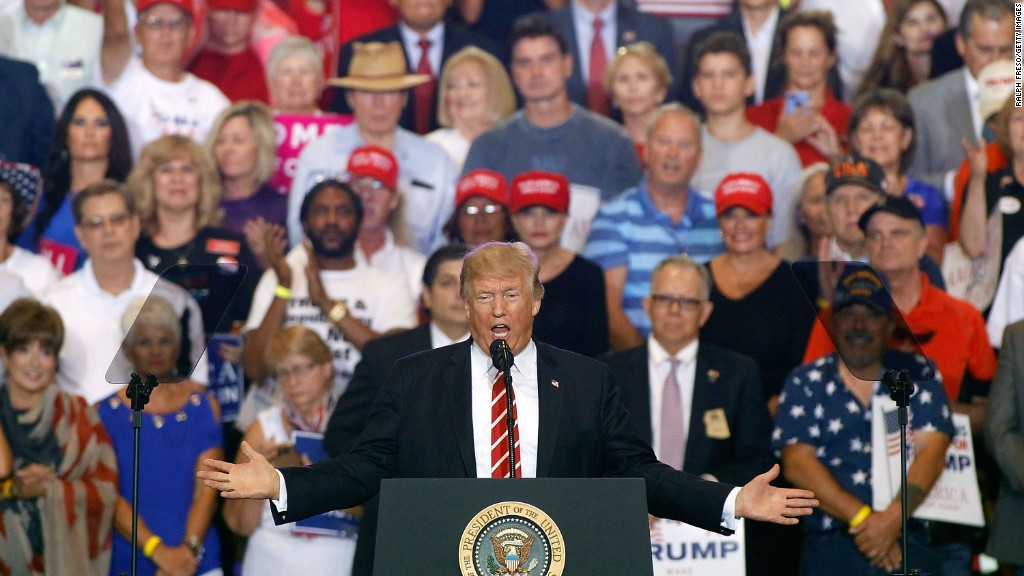
President Trump seemed to put NAFTA negotiations on thin ice Tuesday night.
"Personally, I don't think we can make a deal because we have been so badly taken advantage of," Trump said during a rally in Arizona, referring to the free trade deal between the U.S., Canada and Mexico. "I think we'll end up probably terminating NAFTA at some point."
Trump's timing was more surprising than his comments. NAFTA negotiations just started.
U.S. Trade Representative Robert Lighthizer, completed the first round of talks with leaders from Canada and Mexico on Sunday. Round 2 starts September 1st in Mexico City.
Related: Trump: We'll probably end up killing NAFTA
Lighthizer reiterated Wednesday that withdrawing from the trade agreement is still very much an option.
"President Trump has been clear from the very beginning that if the NAFTA renegotiation is unsuccessful, he will withdraw from the agreement," Lighthizer said in a statement, adding that he's working on "substantial changes" in the deal to fix its "fundamental failures."
Trump routinely blasts the three-nation pact and claims it has cost the U.S. millions of jobs and countless shuttered factories.
Trade experts say Trump's tough talk could all be a ploy to make Mexico and Canada bend to his demands. After all, a new NAFTA is better than no NAFTA.
"They need to make the other parties believe the options are substantial changes or no NAFTA," says Tim Keeler, former chief of staff at USTR during the Bush administration. "In every negotiation, the threat of walking away from the table, and how believable it is, is a pretty key aspect."
Related: NAFTA talks: Round 1 is over. Here's what's next
It's not the first time Trump has threatened to withdraw from NAFTA. In April, he said he planned to pull out, but Mexican President Enrique Peña Nieto and Canadian Prime Minister Justin Trudeau, convinced him to come to the negotiating table. White House officials also encouraged Trump to renegotiate.
All the tough talk may be an effort by Trump to give Lighthizer more leverage. He won't have to convey Trump's views to his counterparts: They can Google them.
"Trump's comment is an extreme version of the 'bad cop' routine, with Lighthizer playing the 'good cop,'" says Gary Hufbauer, a top NAFTA expert at the Peterson Institute for International Economics.
The U.S. has already staked out positions that Canada and Mexico oppose. It plans to propose removing a key, though controversial, element that protects companies' investments abroad. It also wants to change another provision that could force companies to manufacture more in the U.S.
Related: Renegotiating NAFTA -- in 14 easy steps
For now, there appears to be a considerable gap in views.
"Unless Mexico and Canada capitulate to some of Trump's aggressive demands in negotiations during the next four months, termination looks genuinely possible," Hufbauer added.
Adam Austen, a Canadian government spokesman, emphasized the strong economic ties between the two nations: 9 million American jobs depend on trade and investment with Canada.
"Trade negotiations often have moments of heated rhetoric. Our priorities remain the same, and we will continue to work hard to modernize NAFTA," Austen told CNNMoney in response to Trump's comments in Arizona.
All sides will have to work very quickly in the coming months. Trade deals usually take years to negotiate. NAFTA negotiators, by contrast, have just a few months to get a new deal.
Mexico's presidential election next July represents a hard deadline for a deal. The front runner for the election, Andres Manuel Lopez Obrador, has promised to get tough on trade with the U.S.
Mexican officials seemed unaffected by Trump's threat to withdraw.
"No surprise: We're in a negotiation now, Mexico will still be at the table with serenity, strength and the national interest in front," Mexico's foreign minister, Luis Videgaray, tweeted Tuesday night.


